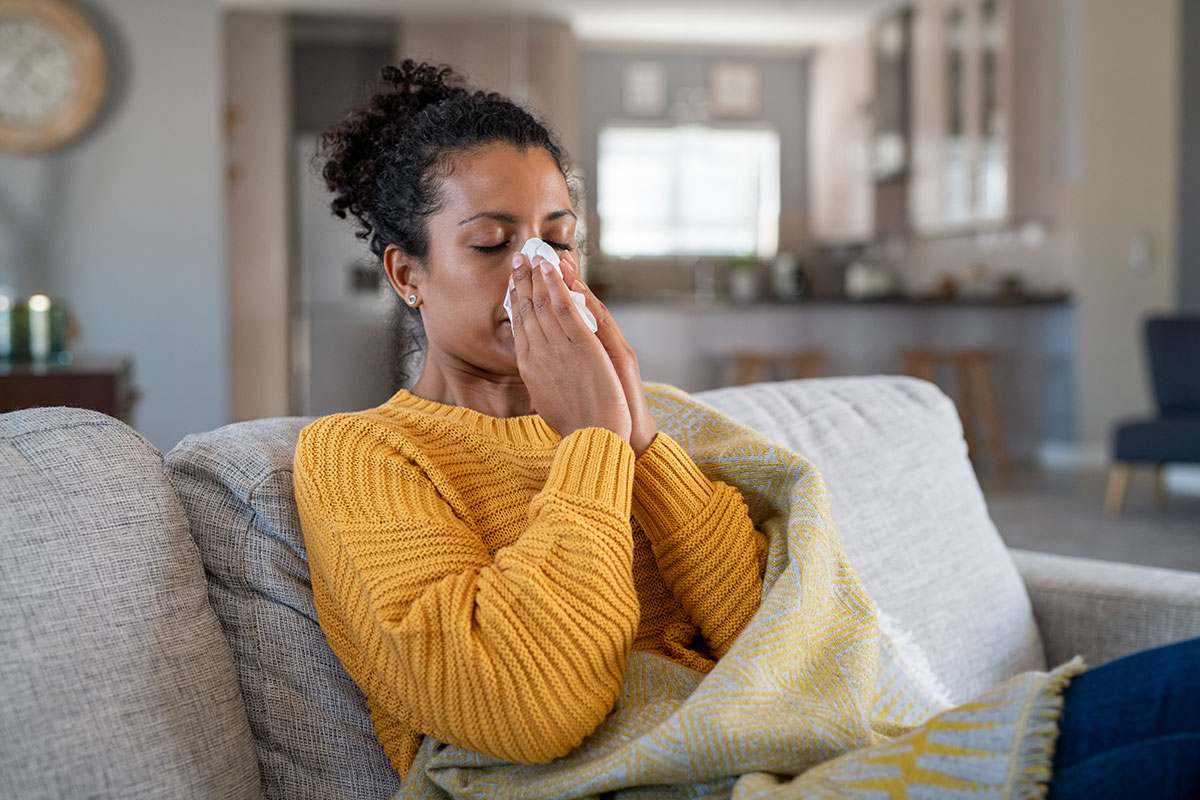Ah, allergies—you know the feeling all too well. Or so you think. Because during flu season, you might start questioning whether something more serious—like influenza—could be causing your symptoms. Can allergies feel like the flu? And if so, how do you tell these two conditions apart? We’ve got the answers you need.
Flu vs. Allergies: Similar Symptoms
The following symptoms can be indicative of either allergies or a flu infection, making it difficult to tell what’s actually at the root of your illness:
- Sneezing
- Runny nose
- Congestion
- Sore throat
- Coughing
- Headache
- Fatigue
Flu vs. Allergies: Differing Symptoms
The only way to truly know what’s causing your symptoms is to visit a trained medical provider, who will be able to evaluate your condition and supply you with an accurate diagnosis. With that being said, there are a few key differences between allergy symptoms and flu symptoms that can make it easier to distinguish between the two conditions:
- Fever – If your temperature is higher than normal, you probably have the flu or something else, since allergies typically don’t cause a fever.
- Itchiness – The flu usually doesn’t cause itchiness, so if you’re experiencing itchy or watery eyes, you more than likely have allergies.
- Body aches – Although the inflammation caused by allergies can sometimes lead to achiness, body aches are much more commonly associated with the flu.
What Causes Each Condition?
If you’re trying to determine whether you have allergies or the flu, it can also be helpful to think about what might have led to the sickness. An allergic reaction occurs when someone’s immune system mistakenly identifies a normally harmless substance as dangerous, and then takes the steps necessary to fight it off. Some common allergens include pollen and animal dander. So, if you started feeling under the weather after spending time outdoors or with a friend’s new pet, then chances are good that you might be experiencing allergies.
The flu, on the other hand, is a viral infection caused by various influenza viruses. According to the Centers for Disease Control and Prevention (CDC), most experts believe that these viruses are primarily spread through airborne droplets produced when an infected person sneezes, coughs, or talks. The flu can also be contracted when someone touches a contaminated surface and then touches their nose, mouth, or eyes. So, if you’ve recently been in contact with someone who was diagnosed with influenza, then it’s likely you could also have the flu.
How Is Each Condition Treated?
One of the main reasons to determine whether it’s the flu or allergies is because the answer will influence your course of treatment. Once an experienced medical provider has diagnosed what’s causing your symptoms, they will supply you with customized treatment recommendations and prescribe any necessary medications. For example, if you’re experiencing allergy symptoms, a provider may instruct you to:
- Take allergy medication
- Use a nasal spray
- Rinse your sinuses with a neti pot
- Inhale steam
- Apply a cool compress
But if a provider determines that your symptoms have resulted from the flu—rather than allergies—they may instead recommend that you:
- Take flu medication (notably, antiviral medications like Tamiflu are typically most effective when administered within 48 hours after the onset of symptoms, so it’s important to not delay seeking care for suspected flu symptoms)
- Drink plenty of fluids
- Rest and avoid strenuous activity
It’s important to keep in mind that while allergy symptoms and flu symptoms are usually relatively mild, in some cases they can become quite severe. Urgent care providers generally don’t treat life-threatening conditions, so if you’re experiencing any of the following symptoms, you should call 911 or get to a nearby emergency room as quickly as possible:
- A rapid but weak pulse
- Chest pain
- Difficulty breathing
- Severe lightheadedness or dizziness
- Loss of consciousness
- Sudden headache or confusion
Allergy & Flu Treatment in Connecticut & New York
Whether you have allergies, the flu, or something else entirely, you can turn to Yale New Haven Health Urgent Care for diagnosis and treatment. We operate numerous immediate care centers across Connecticut and New York, all of which are open 365 days per year with extended hours. Click here to find out whether there’s a Yale New Haven Health Urgent Care near you.
Best of all, our treatment services are available on a walk-in basis, so you won’t have to deal with scheduling an appointment ahead of time. Instead, simply stop into one of our locations at a time that’s convenient for you. We also have an online booking option available for individuals who would like to reserve their spot in line, as well as Virtual Visits for those who would prefer to receive care in the comfort of their own home. Our integrated telehealth service is available 24/7, making it possible for you to speak to a local provider in the middle of the night, if necessary—all you’ll need to do is log on to our secure videoconferencing platform using a video-enabled smartphone, tablet, or computer, and then you’ll be able to describe your symptoms and receive personalized care recommendations.




